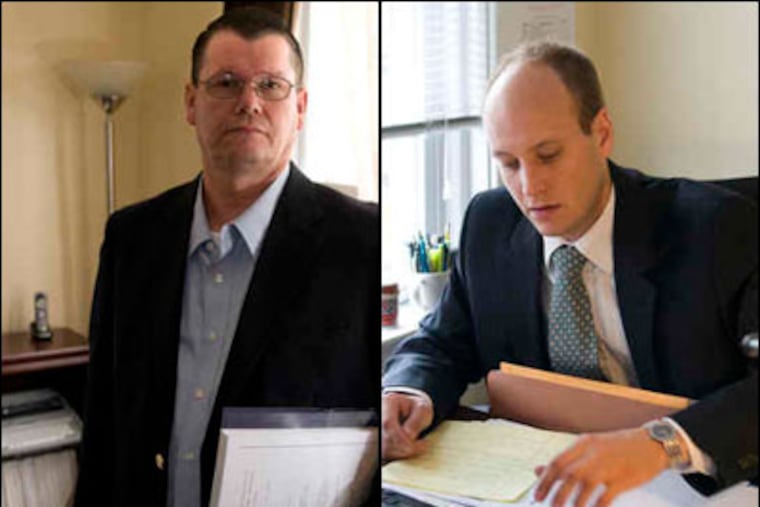Cheltenham cops sued, ripped by judge
Be careful what you say about Cheltenham Township cops. They might throw the book at you. Francis Burke, an Army veteran from Glenside, learned that lesson the hard way when he claimed in 2008 that he was assaulted by police and strip-searched after being arrested outside his home.

Be careful what you say about Cheltenham Township cops. They might throw the book at you.
Francis Burke, an Army veteran from Glenside, learned that lesson the hard way when he claimed in 2008 that he was assaulted by police and strip-searched after being arrested outside his home.
Police not only dismissed the complaint, but charged Burke with eight counts of unsworn falsification, filing a false report and related offenses.
"I was shocked. I knew it was in retaliation," said Burke, 54, who is suing the Montgomery County township, police Chief John Morris and five police officers.
When Burke's second criminal case got to court in March, Common Pleas Judge Paul Tressler blasted the police department for filing that round of charges, saying it reeked of a "cover-up" aimed at preventing Burke from seeking civil damages from the department. Tressler found Burke not guilty on all counts.
"Get off the bench," Tressler told Cheltenham Police Lt. John Salmon, after he finished his testimony in the case. Salmon was the Internal Affairs officer who investigated Burke's police-brutality complaint.
"I think he is a liar," Tressler said of Salmon, according to the trial transcript. The judge added: "I don't believe a word out of his mouth, and I am insulted that I have to say that about a police officer."
Salmon did not return a phone call seeking comment.
"It's downright scary," Burke's attorney, Daniel Pallen, said of the department's treatment of his client.
It began the night of April 6, 2008, when Burke's ex-wife called police to complain that he had been drinking and was playing loud music in his truck in their driveway, according to the incident report.
Police said that when they arrived, Burke became belligerent and was shouting obscenities. He was charged with public drunkenness and disorderly conduct, both summary offenses. In July 2008, Burke pleaded guilty to disorderly conduct for making unreasonable noise, but was found not guilty of public drunkenness.
Two days after his arrest, Burke filed a complaint with Cheltenham police, claiming that cops had assaulted him during the arrest and at the station, and had forced him to remove all of his clothes, including his underwear.
"They took me by the back of my head and slammed it on the roof of the patrol car where the bar light is," Burke said during an interview at his attorney's office. He said officers also threw him to the ground, punched him and kneed him in the head, causing bruises and scrapes.
"They just wanted to have their way and that was it," said Burke, a former Army sergeant who said he served in Grenada during the 1983 Operation Urgent Fury invasion.
Burke's federal lawsuit, filed in Philadelphia last month, alleges that police used excess force, then maliciously prosecuted him after he complained to Internal Affairs. Yesterday, his attorney added a First Amendment count to the suit, claiming that the department's "retaliatory actions" violated his right to free speech.
"We look forward to the opportunity to defend against these baseless charges," said attorney Christopher Boyle, who is representing Cheltenham in the suit. He said that Burke's claim that he had been beaten was unfounded and that the department was "absolutely" justified in subsequently charging Burke for filing a false report.
"If you make a false statement that tends to incriminate somebody, then you could be charged," said Montgomery County Assistant District Attorney Abigail Silverman, who brought Burke's case to trial.
Tressler, the judge, said he didn't believe that police had acted inappropriately while arresting Burke, and doubted that he would prevail in a lawsuit, according to the trial transcript.
"But that's not the issue. The issue is whether or not the police then had a right to turn around and file these charges against you," Tressler told Burke, referring to the false-statement charges. "I don't think they had that right. I think it was a cover-up."
"Since 1966, I have been serving as a prosecutor or as a judge, and I have never been so insulted by a police department," Tressler said of Salmon, the Internal Affairs officer, whom he described as "discreditable."
Wesley Oliver, who teaches constitutional law and criminal procedure at Widener Law School in Harrisburg, said it is unusual for a police department to use a citizen's complaint as the basis for criminal charges.
"It's analogous to a person suing you, then you responding with a countersuit claiming that it's a frivolous lawsuit," Oliver said. "I've never really heard of that happening before, but obviously the judge didn't buy it. It really does seem outrageous."